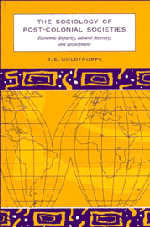Book contents
- Frontmatter
- Contents
- Preface and acknowledgements
- 1 Introduction and argument
- 2 Technology, society, and population
- 3 The colonial episode and the race question
- 4 Economic conditions
- 5 Environmental concerns
- 6 The social sciences and the ‘Third World’
- 7 The rise of towns
- 8 Family life in a changing world: two studies
- 9 Cultural diversity, language, education, and communications
- 10 Religion and development
- 11 Individual modernization: some psychological studies
- 12 Politics in post-colonial states
- 13 Aid and development
- Notes
- Index
7 - The rise of towns
Published online by Cambridge University Press: 03 May 2011
- Frontmatter
- Contents
- Preface and acknowledgements
- 1 Introduction and argument
- 2 Technology, society, and population
- 3 The colonial episode and the race question
- 4 Economic conditions
- 5 Environmental concerns
- 6 The social sciences and the ‘Third World’
- 7 The rise of towns
- 8 Family life in a changing world: two studies
- 9 Cultural diversity, language, education, and communications
- 10 Religion and development
- 11 Individual modernization: some psychological studies
- 12 Politics in post-colonial states
- 13 Aid and development
- Notes
- Index
Summary
Town life is not new; indeed, it is more than just a play on words to say that it is as old as civilization. However, while hunting and food-gathering people had no towns, and the neolithic culture which was the basis of the pre-industrial civilizations supported an urban minority, the rise of industry has been associated with a process of urban growth in which most people in developed countries have come to live in towns. Although in the present-day poor countries the urban population is smaller, it is growing, and indeed one of the most obvious changes that is taking place in these countries is a worldwide movement of people from the country to towns which are experiencing rapid, even headlong growth. But in a world in which the dominant technology is capital-intensive, that migration is not generally matched by a corresponding expansion in modern-sector employment. It is this which gives contemporary urbanization in the poor countries its special character, and many of its special problems.
Urban development in historical perspective
The first towns, such as Ur of the Chaldees and Mohenjo-Daro in India, seem to have arisen before 4000 BC, and their life was clearly related to aspects of neolithic technology. Agriculture made it possible to accumulate stores of food, and this enabled some people to live by working at crafts other than agriculture and selling the products for food.
- Type
- Chapter
- Information
- The Sociology of Post-Colonial SocietiesEconomic Disparity, Cultural Diversity and Development, pp. 133 - 141Publisher: Cambridge University PressPrint publication year: 1996



